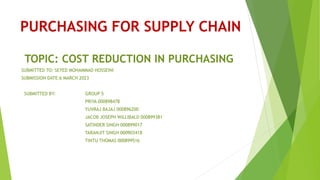
FINAL COST PPT.pptx
- 1. PURCHASING FOR SUPPLY CHAIN TOPIC: COST REDUCTION IN PURCHASING SUBMITTED TO: SEYED MOHAMMAD HOSSEINI SUBMISSION DATE:6 MARCH 2023 SUBMITTED BY: GROUP 5 PRIYA 000898478 YUVRAJ BAJAJ 000896200 JACOB JOSEPH WILLIBALD 000899381 SATINDER SINGH 000899017 TARANJIT SINGH 000903418 TINTU THOMAS 000899516
- 2. Cost reduction in purchasing Introduction Cost reduction in purchasing mean save costs by using several techniques without affecting the quality and by changing the operations while purchasing In a broader view, Cost reduction means financial savings achieved during the purchasing process, but it comprises even more. Renegotiating contract terms and conditions, streamlining administrative and operational processes, and making wise use of data and technology are just a few ways to save money.
- 3. Example Closing facilities, downsizing to a smaller office or moving to a less expensive building or region, and lowering or eliminating outside professional services, such as advertising agencies and contractors, are just a few examples of cost-cutting techniques that can be used.
- 4. METHODS OF COST REDUCTION IN PURCHASING
- 5. OUTSOURCING OF ACTIVITIES A practise known as outsourcing involves delegating to specialised outside suppliers non-essential procurement tasks or services. It works particularly well for indirect procurement categories like facilities management, security, transportation, and logistics. The advantages of cost reduction are 1.Cheap internal resources are freed up by outsourcing low value/high volume acquisitions. 2.When there is minimal internal capacity or experience, access to global expertise and market knowledge is possible. 3.Specialists handle time-consuming contracting and negotiations.
- 6. CONTROL ON OPERATIONS By guaranteeing the optimal use of administrative resources, sound procurement planning helps cut expenses. A lack of preparedness results in costly emergency procurement measures and significant transportation costs. We can cut transaction costs and extra paperwork by optimizing internal P2P operations, whether or not they are automated.
- 7. Engage with local suppliers Conduct market research Develop relationships with local suppliers Monitor supplier performance
- 8. Request supplier discounts Request volume discounts Build a strong relationship Negotiate Better payment terms
- 9. Develop a training program Provide on-going education Encourage Cross functional collaboration Educate and train staff
- 10. MAVERICK BUYING MONITOR PURCHASES ESTABLISH PROCUREMENT POLICIES AND PROCEDURES COMMUNICATE POLICIES AND PROCEDURES
- 11. QUALITY BUYING SUPPLIER EVALUATION IDENTIFY COST SAVING AREAS PRIORITIZE QUALITY OVER COST
- 12. UTILIZE TECHNOLOGY E-PROCUREMENT SYSTEMS SPEND ANALYSIS SOFTWARE ONLINE MARKET PLACES
- 13. CHANGES IN CONTRACTS There is probably room to review certain pricing that has become anti-competitive, as well as the terms of payment. You may be able to receive bulk savings by talking to your suppliers about possible adjustments to your purchasing frequency.
- 14. Use economies of scale Costs are increased across your supply chain by small, repetitive orders. By centralizing the purchasing process across all locations and departments, you can benefit from bulk savings and reduce your per-unit cost.
- 15. Seek discounts from the supplier Despite the fact that it can seem elementary, doing so can actually save your procurement costs rather significantly and is one of the simplest strategies to do so. It becomes simpler when you make frequent purchases from a select group of merchants and develop a strong rapport with them; this gives you more negotiating power. Talk to them about a price; you might offer early payment or larger orders.
- 16. BENEFITS IMPROVED CASH FLOW INCREASED PROFITABILITY IMPROVED CUSTOMER SATISFACTION MORE SUSTAINABLE OPERATIONS
- 17. ADVANTAGES LOWER COSTS COMPETITIVE ADVANTAGES IMPROVED EFFICIENCY BETTER SUPPLIER RELATIONSHIPS
- 18. CONCLUSION In conclusion, cost reduction in purchasing can be an effective way for companies to improve their financial position, competitiveness, and operational efficiency. By reducing costs, companies can increase profitability, improve cash flow, and offer more competitive prices to customers. Cost reduction efforts can also lead to better supplier relationships, more sustainable operations, and increased innovation.
- 19. References https://sievo.com/blog/cost-savings-strategies-for-procurement https://limitlesstechnology.com/benefits-cost-reduction-vendor- management-solutions/ https://www.order.co/blog/procurement/procurement-cost/ https://una.com/resources/guide/cost-reduction-strategies-in-procurement/ https://www.researchgate.net/publication/238327434_Business-to- business_e-procurement_Success_factors_and_challenges_to_implementation